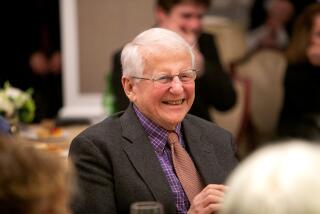Op-Ed: Patt Morrison asks: Shakespeare scholar Ron Rosenbaum
He’s not just the most famous writer in human history – out of all 100 billion of us ever to live on this planet, he’s one of the most famous people. William Shakespeare died exactly 400 years ago, in the same English town where he was born. His contemporary, the playwright Ben Jonson, said he was “not of an age, but for all time.” Every manner of controversy has attached itself to Shakespeare – from his possibly missing head to whether he even wrote those plays and poems. Ron Rosenbaum is a Shakespeare scholar, author of the book “The Shakespeare Wars,” and he’s marking this 400th anniversary speaking at the Hammer Museum on Thursday. What’s the magic of this Bard, dead 40 decades, and will it still enthrall us four centuries from now?
CLICK HERE TO LISTEN TO THIS INTERVIEW ON THE ‘PATT MORRISON ASKS’ PODCAST>>
How is it that, 400 years later, we still learn about him, talk about him, argue about him? It can’t be just high school English classes.
When I was a reporter for the Village Voice, I had some assignment that took me to England, and I got to Stratford on Avon, Shakespeare’s birthplace, at just the moment, a great moment in the history of Shakespearean production, when the director Peter Brook was putting on his production of “A Midsummer Night’s Dream.” And up to then I had not been a big Shakespeare fan, but I saw this production of “A Midsummer Night’s Dream,” and it was like I was lifted off the earth. It was transformative.
I’d say that you really need great actors and great directors, and once you get that, the words will take off and lift you off the page, and you’ll never be the same. But it’s rare when it happens.
I think most people go to Shakespearean productions and think, Woah, Shakespeare – this is going to be great. And then they end up walking out thinking, Wait a minute, where’s the greatness? Why did I fall asleep in Act III?
I actually feel the best way to experience Shakespeare these days is to listen to audio tapes. For instance, there’s John Gielgud’s “King Lear.” Or watch Shakespearean films like Laurence Olivier’s “Richard III,” or Orson Welles “Chimes at Midnight.” Because then you get some of the great Shakespearean figures of the past 400 years, and Shakespearean productions that are preserved on film and will not leave you feeling, What’s the fuss about?
The plots in a lot of Shakespeare’s plays are not new. He pinched them rather frankly from other sources and other places. It’s the language that made them different.
In some ways you could think of him as a rewrite man. Almost all of his great works, there are very few that are entirely his own invention. And it is the language that becomes the attraction. There are just stretches of language -- it just knocks you out of your seat, it’s so amazing. And that’s what he contributed: not really the plot of “Henry V,” which was supposedly history, or “Richard III,” which is sort of like fictionalized history. That’s why I suggest people see Laurence Olivier’s “Richard III,” because Olivier’s performance, it’s so shocking, Olivier’s spiderlike conception of evil is so deeply disturbing, that you understand why nothing like this really was seen on stage, and this was the play that made Shakespeare a star.
There’s so little known about Shakespeare, which is the reason many people refuse to believe he wrote all of that brilliant work.
I think the one canard that continues to survive among the people who are called the anti-Stratfordians, the ones who believe Shakespeare didn’t write Shakespeare, or Shakespeare was written by someone else with the name Shakespeare – they all say, Well, he only had a grammar-school education. But in fact at his time, grammar school educations included learning Latin, leaning how to compose poetry in Latin, learning how to translate Latin. It was far different from the kind of grammar school we speak of today.
And in addition, the people say, Well, he set those plays in Italy but he never went to Italy. But there was a vast array of books, of contemporary travelogues to Italy, or romances of Italy. You didn’t have to really leave the Globe Theatre to conjure up Romeo and Juliet’s setting.
Oftentimes you will see versions of Shakespeare where the language is watered down or simplified to be easier to understand. It isn’t Shakespeare without the Shakespearean language, is it?
There’s another effort to “modernize,” or, as I call it, dumb down Shakespeare going on. And so I feel dumbing down the language or aka modernizing it is just the most destructive thing. Either do [Shakespeare] or not do it, but don’t try to treat the audience like children.
Another big controversy in the academic world is whether Shakespeare was a literary artist, whether he designed his plays to be read, or put on in the playhouse, or whether he cared about how carefully they were printed. Or whether he, just as in that movie “Shakespeare in Love,” sent them over to the playhouse and went back to wenching. I think there’s a case to be made that Shakespeare was a careful literary artist, and that reading him was something that he hoped people would do.
Shakespeare also populated his plays with extraordinary women like Cordelia in King Lear, and Lady Macbeth, and with ethnic and religious minorities like Othello, and Shylock in “The Merchant of Venice.”
I’ve always felt “Othello” was almost unbearably tragic. I almost can’t read it or see it, it’s just painful. I feel the same way about Shylock, but with Shylock there’s always a moment. Directors like to put on this play because there’s a lot of director-y stuff they can do with it, and actors like to act it. But I still feel Shylock has this kind of fundamental anti-Semitic DNA – not that Shakespeare was an anti-Semite, but that he took on anti-Semitic tropes, anti-Semitic models, and so I have trouble with that.
More, I have trouble with people who claim that the solution to this is to humanize Shylock, because always, if you’re doing Shylock, you’re going to have a Jew willing to stab a Christian in the heart for money. And there’s no getting around that, or you’re not doing “The Merchant of Venice” -- you’re doing some other play.
What you say about women is fascinating. There are all these witty women in the comedies, and then there is Lady Macbeth, who is scary. For a long time, you know -- several of those centuries in the last 400 years -- there weren’t many outspoken, strong, fierce, admirable, witty women in drama. And I think that Shakespeare’s women provide the kind of panoply of potential models for self-determined women.
And then there’s a question of, does Shakespeare believe in love? And I think it could seem -- every time I reread or see “A Midsummer Night’s Dream,” I can’t make up my mind whether he’s making fun of the idea of love, that it’s just an illusion created by drops in the eyes, or whether he believes at the end that there’s some genuineness to love. That’s one of the great ambiguities and I don’t know if it has to do with women alone, or men and women.
Is Shakespeare in a way the means by which we can perhaps come closest to understanding what people were thinking, doing, saying, believing in the 16th and 17th centuries?
Some of the plays are set in different centuries, very few are actually set in contemporary London. There are lot of playwrights who do that, but he tends to take far-off places. It was very dangerous – people don’t necessarily realize what a police state Queen Elizabeth was running, and how there were spies and torturers and horrible executions for heresy. And so yes, even “Hamlet,” which focuses on the ghost who comes from purgatory – this was at the very height of the persecution of Catholics who believed in purgatory, so “Hamlet” is a very dangerous play. I still don’t know how he got away with it!
What people can always come back to are the words, more than 1700 words that Shakespeare created or put on the page: lackluster, household words, dawn -- we could spend our entire time just listing these words. How profoundly have those, and the idea of the flexibility of language, influenced us?
Puns too! He not only invented words but he invented connections between words that sounded alike or meant alike. I wouldn’t say he introduced punning but he introduced the idea that words could have a kind of varied gradations and connections and links between them. Nobody did it better.
How different would our modern Western culture be without this dead white European male and his work?
I think there are so many great writers, dramatists, in Western culture and in Eastern culture and in the Southern hemisphere culture that it’s not like people would be impoverished for great writing and drama. You know something that Peter Brook, that great director of “A Midsummer Night’s Dream,” said to me once about Shakespeare: he said most of us live lives where we’re about 10% alive. There’s some people who are lucky enough to live lives in which they’re 100 percent alive. Shakespeare walked around London living a life that was a million percent alive.
I get what he was saying, that he was a unique character.
And would our culture be different without it? I think perhaps; anyway we wouldn’t have that kind of northern star, that pole star of genius to gaze at when we thought about the possibilities of literature.
Follow the Opinion section on Twitter @latimesopinion and Facebook
More to Read
A cure for the common opinion
Get thought-provoking perspectives with our weekly newsletter.
You may occasionally receive promotional content from the Los Angeles Times.







